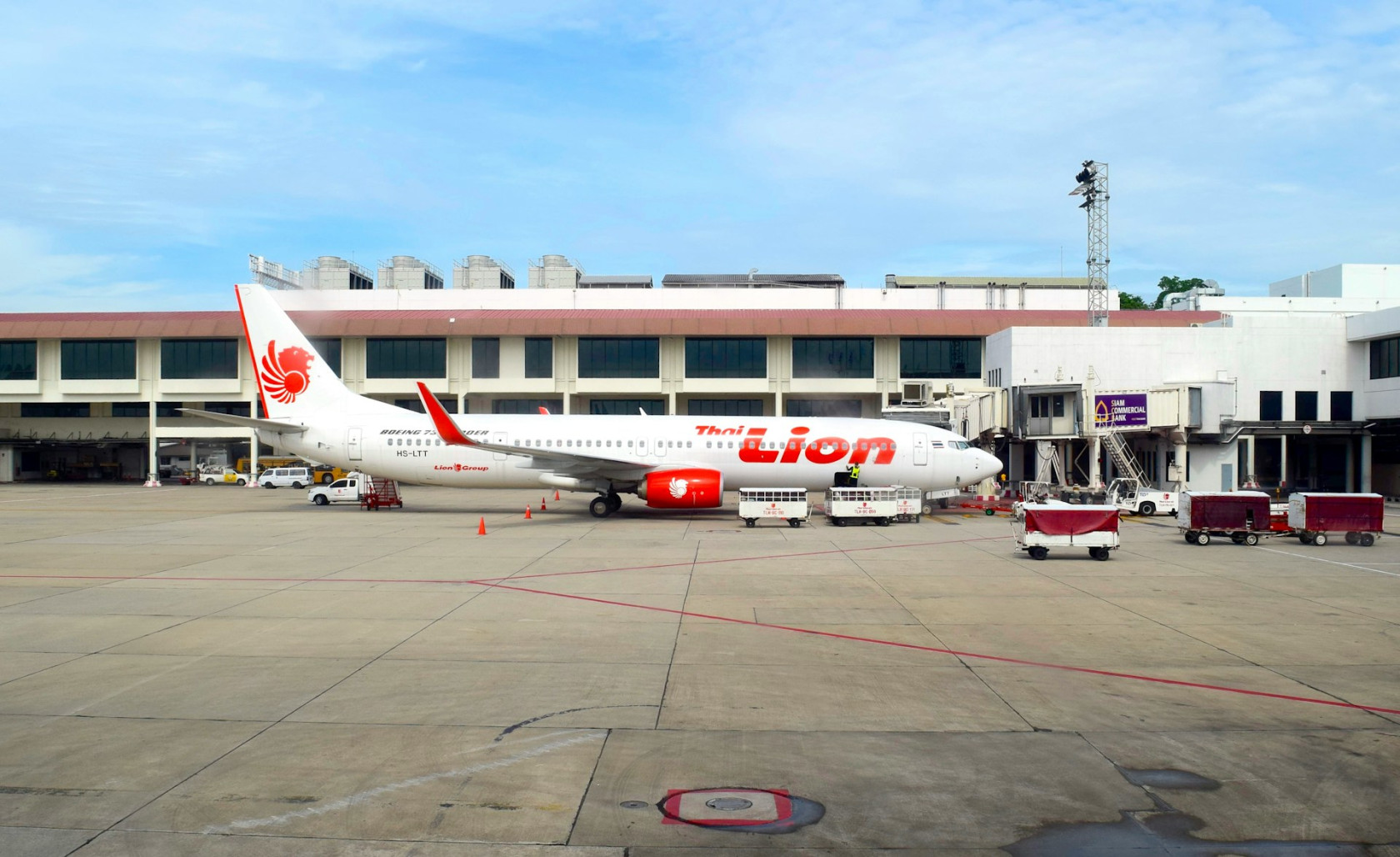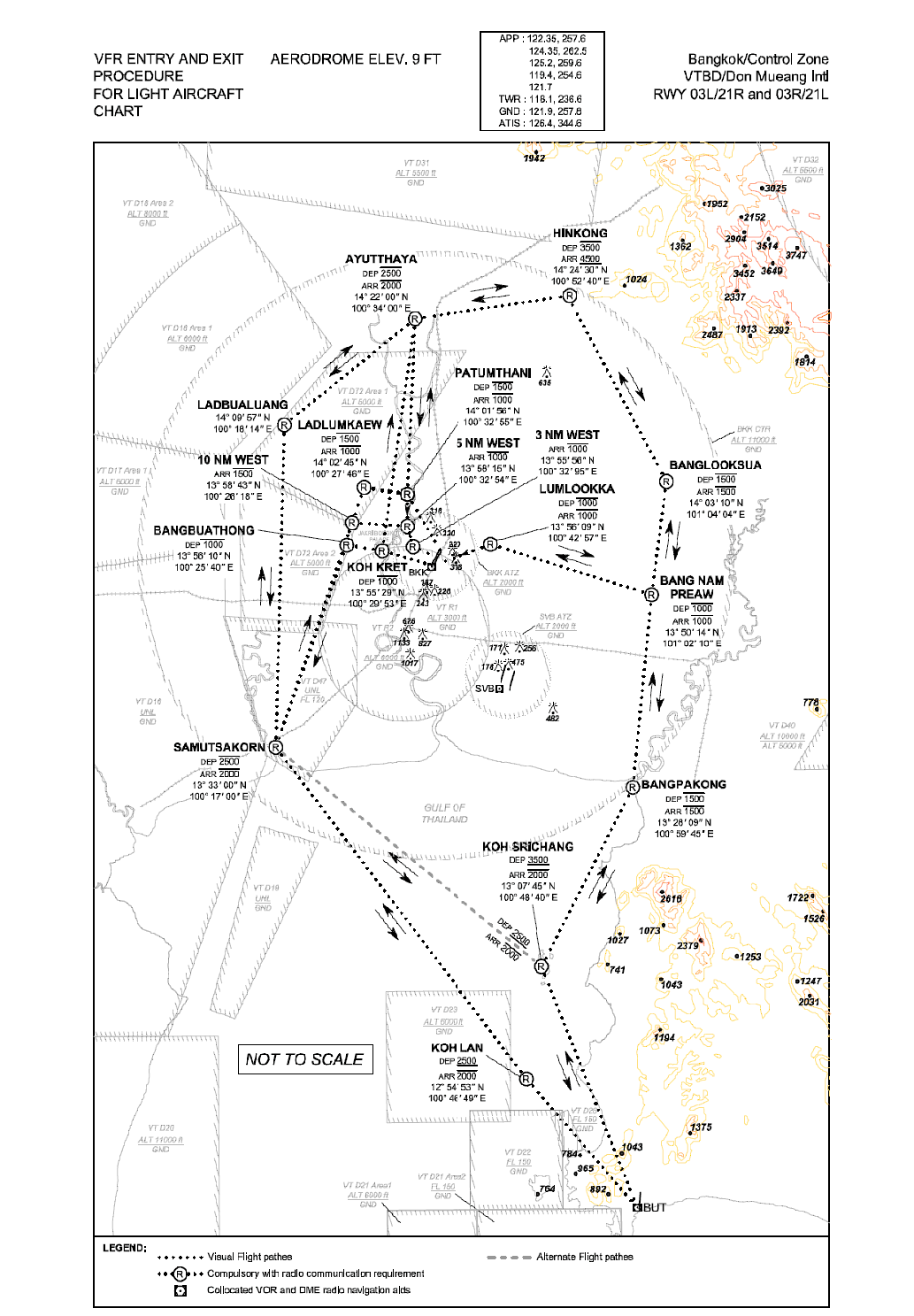VTBD - Don Mueang Airport
Overview
Don Mueang Airport (VTBD) is an airport located within Bangkok. It used to serve all flights for Bangkok; however, with the opening of Suvarnabhumi Airport, the airport now primarily serves domestic flights in addition to some international flights, along with business, general aviation, and military traffic.
ATC frequencies
| Identifier | Radio Callsign |
Frequency | Remarks |
| VTBD_DEL | Don Mueang Delivery |
127.700 MHz |
|
| Don Mueang Ground |
121.900 MHz | ||
| VTBD_TWR | Don Mueang Tower |
118.100 MHz |
|
| VTBS_APP |
Bangkok Approach |
124.350 MHz | |
| Don Mueang Approach |
119.400 MHz |
||
| VTBD_F_APP |
Don Mueang Arrival |
121.100 MHz |
Arrivals below 7000ft |
| - | 128.800 MHz |
Gates
At Don Mueang, there are two passenger terminals. Terminal 1 is for international flights and is located to the north, while Terminal 2 is for domestic flights and is located to the south.
Domestic flights
- Gate 31-36
- Gate 41-46
- Gate 51-56
- Bangkok Airways ATR72 only uses Stand 67
- Remote stands
International flights
- Gate 12, 14, and 15
- Gate 21-26
Business, GA, Cargo flights
- South apron
Military traffic
- East apron (east of 03R/21L)
Preferential runway system
The runway in use on VATSIM does not necessarily follow what is used in real life all the time for various reasons, including but not limited to traffic, controller discretion, etc.
Due to the proximity of the approach path of the 03 runways over densely populated areas in Bangkok, a strong preferential runway system is used towards the 21 runways.
Generally, the 21 runways are used as long as the tailwind component does not exceed 10 knots.
The normal configuration of the runways are as follows:
- 03L/21R: Civil traffic (departing & landing)
- 03R/21L: Military traffic (departing & landing)
- During busy traffic periods, civil traffic may depart from 03R/21L as well.
Transition Altitude & Transition Level
For all airports in Thailand, the transition altitude is 11,000ft and the transition level is always FL130.
Departing flights
IFR Clearance
On initial contact, state stand number and received ATIS.
| 👨✈️ | Don Mueang Delivery, sawasdee krub, NOK AIR 124, information B, gate 34, requesting IFR clearance to Chiang Mai |
| 🎧 | THAI 104, Delivery, sawasdee krub, cleared to Chiang Mai via flight planned route, TANGO3A departure, runway 21R, initial climb 8000ft, expect FL360, squawk 7120 |
The standard initial climb altitude for 21L/R departures is 8,000ft, 03L/R departures is 6,000ft.
However, ATC may give a different altitude.
Pushback
For gates 20-56, the standard pushback instruction is to face northeast or southwest on taxiway B. If you are unable to execute this, advise ATC on pushback request.
| 👨✈️ | Don Mueang Ground, sawasdee krub, NOK AIR 124, gate A4, requesting push and start |
| 🎧 | NOK AIR 124, Don Mueang Ground, sawasdee krub, push and start approved, facing north on B |
If the pushback is not approved straight away, a reason will be given by the controller.
Taxi
If the departure is from 03R or 21L and you are at the west side of the airport, you will need a clearance to cross runway 21R. Do not cross the runway until you receive a crossing clearance.
Departure
All speed and level restrictions apply unless explicitly cancelled by ATC!
Upon first contact with the departure frequency, state your altitude passing and assigned SID.
| 👨✈️ | Bangkok Approach, NOK AIR 124, passing 1300ft for 8000ft, TANGO3A departure |
You will be identified and given further climb instructions when appropriate. Do not climb above initial climb altitude (usually 8,000ft) until assigned otherwise.
As alluded above, there are restrictions on the SID which need to be followed unless cancelled. Keep an ear out for the following phraseology:
| 🎧 |
NOK AIR 124, climb unrestricted FL160 NOK AIR 124, climb via SID FL160, no restrictions All speed and level restrictions on the SID are cancelled. You still have to maintain 250kts or less below 10,000ft |
| 🎧 |
NOK AIR 124, climb via SID FL160, cancel level / altitude restrictions Only level restrictions on the SID are cancelled, speed restrictions remain |
| 🎧 |
NOK AIR 124, climb via SID FL160, cancel speed restrictions Only speed restrictions on the SID are cancelled, level restrictions remain. 250 kts or less below 10,000ft still applies |
| 🎧 |
NOK AIR 124, direct TANGO All restrictions for waypoints before TANGO are cancelled. You still have to maintain 250kts or less below 10,000ft |
Subsequently, when nearing FL160, you will be handed off to enroute ATC (Bangkok Control) if online.
Arriving flights
During cruise, you will be cleared for an appropriate STAR for the active runway(s). When nearing top of descent, inform the controller that you are ready for descent if instructions have not yet been given.
When nearing FL180, you will be handed off to Bangkok Approach if online.
The default approach type for Don Mueang is ILS Z.
Descent
All STARs have speed and level restrictions. You must follow them unless explicitly cancelled by ATC, or if instructions were given at a time where it is impractical to meet those restrictions.
| 🎧 |
NOK AIR 125, descend via STAR 5000ft QNH 1013, no restrictions All speed and level restrictions on the STAR are cancelled. You still have to maintain 250kts or less below 10,000ft |
| 🎧 |
NOK AIR 125, descend via STAR 5000ft QNH 1013, cancel level / altitude restrictions Only level restrictions on the STAR are cancelled, speed restrictions remain |
| 🎧 |
NOK AIR 125, descend via STAR 5000ft QNH 1013, cancel speed restrictions Only speed restrictions on the STAR are cancelled, level restrictions remain. 250 kts or less below 10,000ft still applies |
| 🎧 |
NOK AIR 125, direct BD111 All restrictions for waypoints before BD111 are cancelled. You still have to maintain 250kts or less below 10,000ft |
If traffic levels are low, you may be given "direct to" instructions to shorten the track miles to landing.
Approach clearance - 21L/R
For SABAI3A and SEHNA3A arrivals, it is possible to receive an instruction "After BD112, direct BD111" to shorten the track miles.
Other arrivals may receive a direct to BD111.
BD111 is the intermediate fix for both ILS Z 21L/21R and you can expect to be cleared for the ILS approach from this waypoint.
In addition to this, the controller may choose to vector you onto the ILS, the standard altitude to clear for the approach is 1600ft.
Approach clearance - 03L/R
Due to the proximity of the approach path to restricted areas in central Bangkok, the approach involves many waypoints before the localizer and glideslope. Please review the chart and ensure you select the approach correctly.
ILS Z 03L: DOTLI -> KAGET -> BONDU -> LURPO -> BD310 -> RW03L
The terminating waypoint of 03L/R STARs is DOTLI. For the ILS Z approach, it is important that you choose VIA DOTLI in your flight management computer.
In real life, it is common for aircraft to be vectored, given a "direct to" instruction to BONDU, then cleared for the ILS Z approach from there.
Speed control
To facilitate traffic flow, ATC may issue speed instructions such as follows:
| 🎧 |
NOK AIR 125, speed 160 knots or greater until 6 miles final |
Landing
On first contact with Tower, state your callsign and arriving runway. You will be given the weather information, and if there is no preceding traffic for the runway, you will be cleared to land.
For civil traffic, if landing on 21L/R, vacate to the right, and vice versa if landing on 03L/R.
Please ensure you vacate the runway completely. Additionally, with instructions, please turn onto the assigned taxiway without stopping at the runway exit.
If you have a particular stand in mind, please inform Ground on initial contact.
VFR flights
In real life, VFR flights to/from Don Mueang can be seen almost every day - both civil and military VFR traffic (Diamond DA40) are present at the airport.
Controlled airspace
- Don Mueang Aerodrome Traffic Zone - a circle of 5nm radius around VTBD, SFC-2,000ft
- Bangkok Control Zone - a circle of 35nm radius around VTBD, SFC-11,000ft
- Bangkok Terminal Control Area - a circle of 50nm radius around VTBD, 3,000ft-FL160
Reporting points
Usually aircraft departing west will be asked to report over Koh Kret, while aircraft departing east will be asked to report over Lumlookka.
ATC clearance
Initial contact will be with Ground (or higher station covering). Request VFR clearance from Ground.
Closing remarks
If you do not understand any instructions on frequency, please do not hesitate to ask for clarification! Our controllers are here to assist you.
Any constructive feedback (no matter positive or negative) for our controllers can be submitted at this page.
Thank you for reading this pilot briefing and we sincerely hope you enjoy your flight to/from Don Mueang Airport!


